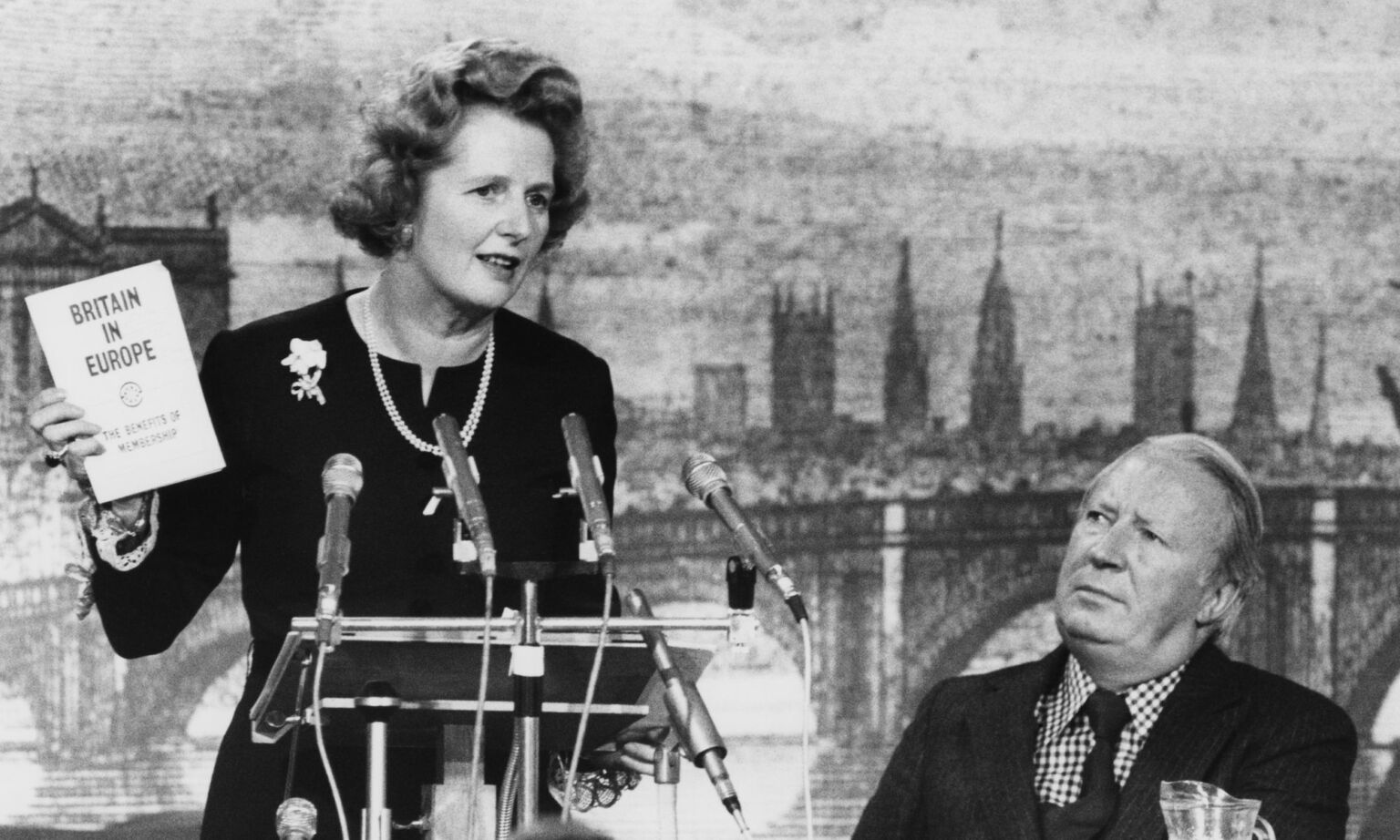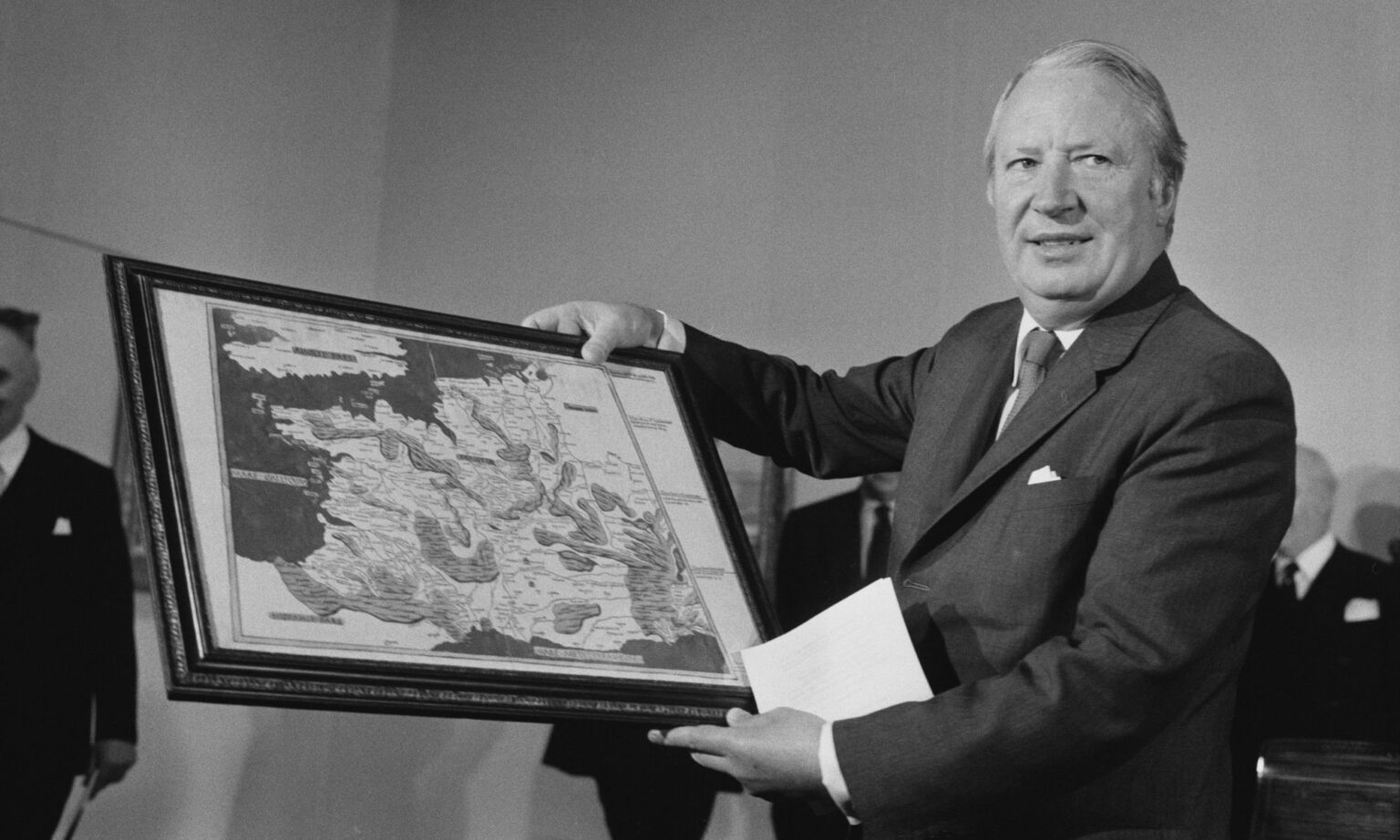
Long-read
50 years of lies about Europe
The case for the EU has always been based on fear, deception and an exaggerated sense of declinism.
Want to read spiked ad-free? Become a spiked supporter.
We joined, we voted to stay, we voted to leave, we left. This year’s 50th anniversary of Britain’s accession to the then Common Market seems a good moment for another look at this half-century detour, marked by persistent collective uncertainty about whether we wanted to join ‘Europe’, stay in it or leave it. Throughout, our national responses have been marked by three things: ‘declinism’, deception (including self-deception) and fear.
On 1 January 1973, Britain (with Ireland and Denmark) formally entered the European Economic Community (EEC). We celebrated with a ‘Fanfare to Europe’, including pop and classical concerts and poetry readings. It followed a campaign in which the leaderships of all the major political parties had agreed on the need to force Britain into ‘Europe’. They were supported by most of the media, most of the intelligentsia and most business lobbies. It had been a decision first made by Harold Macmillan’s Conservative government in 1962, and there was no question of putting it to a popular vote, which might well go the wrong way.
Whitehall’s overwhelming obsession was ‘declinism’. Prime minister Edward Heath’s principal European adviser described Britain as ‘the sinking Titanic’ and the EEC as ‘the lifeboat’. Britain’s chief negotiator, foreign-office mandarin Sir Con O’Neill, put it succinctly, though of course not publicly: the EEC was about power and global influence, and the Americans wanted us in. ‘None of its policies was essential to us; many of them were objectionable’, he said. But outside the fold, ‘our decline towards isolation and comparative insignificance… cannot be arrested’. Britain, he warned, would become merely ‘a greater Sweden’.
This mood of declinism was based on two historical errors, which today are plain for all to see and yet which people still seem to believe. First, economics. It was assumed that the continent’s faster postwar growth (Italy was the star performer) would be permanent and was due to the Common Market. Second, geopolitics. The importance of the empire to Britain was hugely overestimated and so were the consequences of its dismantling. In reality, decolonisation was the lifting of a huge burden, ‘a millstone around our necks’, in Disraeli’s phrase.
Declinism has hamstrung our relations with ‘Europe’ from beginning to end – if indeed we have yet reached the end. The attitudes of Macmillan, Heath and O’Neill were reincarnated by David Cameron, Theresa May and Oliver Robbins, May’s senior adviser on Europe. We were supplicants who had to be grateful for whatever crumbs we could beg, they all believed. The terms for entry in January 1973 were harsh, as were the terms for exit in January 2020. In O’Neill’s pithy phrase, we had to ‘swallow the lot, and swallow it now’. ‘The lot’ did not much change over nearly half a century, and included making large financial payments, accepting agricultural rules to advantage European farmers and penalise other producers, and sharing Britain’s vast fishing grounds. Ultra-Europhile Tory backbencher Sir Anthony Meyer declared in parliament in 1971 that ‘it would be in the interests of this country to join the EEC whatever the terms’. His Remainer successors in the Tory Party had not changed much by 2017, when the Brexit negotiations began. In 2019, in an informal alliance with the opposition, they trampled over the constitution to force Boris Johnson’s government to accept a damaging Withdrawal Agreement rather than risk the supposed disaster of a ‘No Deal’.

Alongside declinism came deception. Politicians and diplomats concealed – sometimes from themselves – the commitment to ‘ever-closer union’ clearly spelt out in the EEC’s founding treaties. The lord chancellor, Lord Kilmuir, informed the Macmillan cabinet that accession ‘would go far beyond the most extensive delegation of powers that we have ever experienced’. The usual response, especially in public, was to dismiss integrationist commitments as empty rhetoric. To whip up some enthusiasm for accession, the Heath government mounted the biggest official publicity campaign since the war. But what accession really meant was disguised and carefully depoliticised: ‘The Community… hasn’t made the French eat German food or the Dutch drink Italian beer.’ The EEC’s faster economic growth was the bait. It was represented on the front of an official pamphlet, The British European, by a female model in a skimpy Union Jack bikini, proclaiming that ‘EUROPE IS FUN! More work but more play too!’
A more serious attempt to convince the public had to be made under Harold Wilson’s Labour government, which to keep the party together had committed itself to renegotiating the accession terms and putting them to a popular vote. On 5 June 1975, a referendum asked: ‘Do you think that the United Kingdom should stay in the European Community (the Common Market)?’ In the run-up to the referendum, Peter Shore, an eloquent Labour Eurosceptic (although they did not yet call themselves this), made an impassioned speech at the Oxford Union arguing that EEC membership meant ‘the transfer of our whole democratic system’, under an arrangement that had not been ‘negotiated’ but merely ‘accepted’ without a comma being changed. The Yes campaign, supported by ‘all the acceptable faces of British public life’, including Anglican bishops and most of the press, echoed what even the Europhile journalist Hugo Young called ‘a golden thread of deceptive reassurance’. They claimed that EEC membership would change nothing that people cared about. Yet the promises of greater prosperity had not materialised – on the contrary, accession raised prices in Britain. The 1973 Arab-Israeli War, and the subsequent oil-price shock, put a sudden end to Europe’s postwar boom. So the argument against ending EEC membership, said Shore, was now nothing but ‘fear, fear, fear’.
The continuity of arguments over half a century is striking, especially the declinism and what in 2016 was aptly called ‘Project Fear’ – indeed, the manufacturing of dodgy economic dossiers is still a thriving cottage industry, even now that we have left. Yet much had changed over the decades. During the 1970s, Britain had experienced political and economic turmoil, to which EEC membership had contributed, and then underwent the rigorous therapy of Thatcherism. This converted most of the Labour Party to ‘Europe’, which it perceived as a barrier against neoliberalism – a flimsy one, as it turned out.
Then, over the following two decades, came changes never envisaged in the 1960s and 1970s: the fall of the Soviet Union, German reunification, eastward expansion of the EU, and the French-led rush to a single currency to try to restrain German financial power. Crucially, the Labour government did not adopt the euro – which Tony Blair’s then Treasury minister, Ed Balls, later called ‘the most successful economic decision of the last 30 years’. It also made Brexit feasible.
For Britain, the most tangible outcome of EU expansion was mass immigration from Eastern Europe, which reignited old debates. Expansion also led to the high-handed imposition of the Lisbon Treaty in 2007 as the de facto constitution of the European Union.
The introduction of the euro did affect Britain indirectly. As many had warned, it damaged European growth and accelerated the relative shrinkage in the EU’s global economic weight. This caused a steady decline in the importance of intra-EU trade for Britain.
The EU’s economic problems reduced its popularity in every country. Support for the ‘project’ peaked in the triumphant 1990s, and subsequently declined, as was shown dramatically in the No votes on a European constitution in the Netherlands and France in 2005. The financial crisis of 2007-08 exposed the fundamental faults in the Eurozone. Brussels imposed crushing austerity on southern Europe, further increasing migration to Britain. By this point, the idea that ‘Europe’ was the way to ever-greater prosperity had evaporated. Economics professor Helen Thompson argues that the Eurozone crisis ‘put a timebomb under the sustainability of Britain’s membership of the EU’. Revived Tory Euroscepticism forced David Cameron to promise a referendum before any further cession of powers. This began the countdown to Brexit.
What surprises me about the 2016 referendum is that the result caused such a shock. The EU’s own opinion polling suggests that similar negative votes would have been likely in the Netherlands, Italy, Greece, Germany and, as President Macron admitted on British television, France. There had already been ‘No’ votes in referendums on European issues in Denmark, Sweden, Ireland, Holland, France and Greece. For the least-enthusiastic member state to have voted to leave should hardly have been a surprise.
At this point, we have to do some rewriting of history. Certainly, I do. I used to argue that Britain’s vote to leave was a logical outcome of both its own history and of developments in the EU. I believed there would be difficulties (not least in finding politicians willing and able to direct the withdrawal), but that the logic of the situation meant that these difficulties would be overcome, and a general acceptance of the 2016 vote would follow. I even wrote that ‘the new generation will wonder why people got so worked up’. Why was I so wrong? Rather naively, I did not expect the EU to be so intransigent, assuming that it would see the importance of maintaining good future relations. Instead, it has seized on Brexit as the bogeyman to convince Europe’s peoples that leaving the EU means disaster. Nor did I expect the British government, especially under Theresa May, to be so feeble in its response, or for her successors to be so paralysed, not least due to Remainer influence within the Conservative Party and the civil service. Declinism still rules Whitehall, to the relief of Brussels.

The result has been almost seven years of uncertainty about whether we are truly serious about leaving the EU, whether deep down we have really left, and whether we shall in some way return to membership. Economic lobbying, political opportunism and constant polemic in the media have inflamed the original division in our politics.
More fundamentally, the Leave-Remain division has become detached from the actual question the referendum was supposed to resolve. I am constantly amazed by how little we know or care about the EU, or even about Europe, and how striking this indifference is among those who like defining themselves as ‘Europeans’. The flagrant political divisions within the EU, its financial instability, the socio-economic damage it does, its policy incoherences, its corruption, its patent failings during the Covid crisis, its disastrous irrelevance over the Ukraine war – nothing seems to dent the determination of the Remainer hardcore to pull us back towards this political black hole.
The inescapable conclusion, it seems to me, is that ‘Europe’ for its diehard supporters is not the really existing EU, but an immaterial symbol of something else, or rather of several other things. The cosmopolitan yearnings of David Goodhart’s ‘Anywhere’ people. The rejection of collective solidarity in favour of a corrosive identity politics. In Scotland, a nationalist utopianism based on the fantasy of risk-free independence inside the EU.
Brexit, conversely, becomes an easy scapegoat for economic discontent, especially among the young, and especially in the public sector. Every failure can be blamed on Brexit, even if the EU has the same problems or worse. Finally, there is a contempt and loathing for those seen as the bedrock of Brexit support – the ‘gammons’, the provincials, the white working class – who cannot be allowed to win. In the end, what the unending Leave-Remain contest comes down to is who rules – or, as Lenin put it, ‘Who will overtake whom?’.
Some may think that having shorter queues at airports and such like is more important than aspirations to democratic self-government – or at least it might seem more ‘concrete’, as Daniel Finkelstein put it recently. We may one day lapse sulkily into what socialist historian EP Thompson once called ‘inverted Podsnappery’ – the belief that ‘other countries’ than one’s own ‘are in Every Respect Better’, especially if you only frequent the holiday destinations.
Unless we can somewhere find a government that is capable of some leadership, some determination and some courage, we might, without giving it much thought, find ourselves drifting back towards the EU just as it collapses. That would indeed be an irony of history.
Robert Tombs is the author of This Sovereign Isle: Britain In and Out of Europe, which is published by Penguin.
Pictures by: Getty.
Who funds spiked? You do
We are funded by you. And in this era of cancel culture and advertiser boycotts, we rely on your donations more than ever. Seventy per cent of our revenue comes from our readers’ donations – the vast majority giving just £5 per month. If you make a regular donation – of £5 a month or £50 a year – you can become a and enjoy:
–Ad-free reading
–Exclusive events
–Access to our comments section
It’s the best way to keep spiked going – and growing. Thank you!






Comments
Want to join the conversation?
Only spiked supporters and patrons, who donate regularly to us, can comment on our articles.